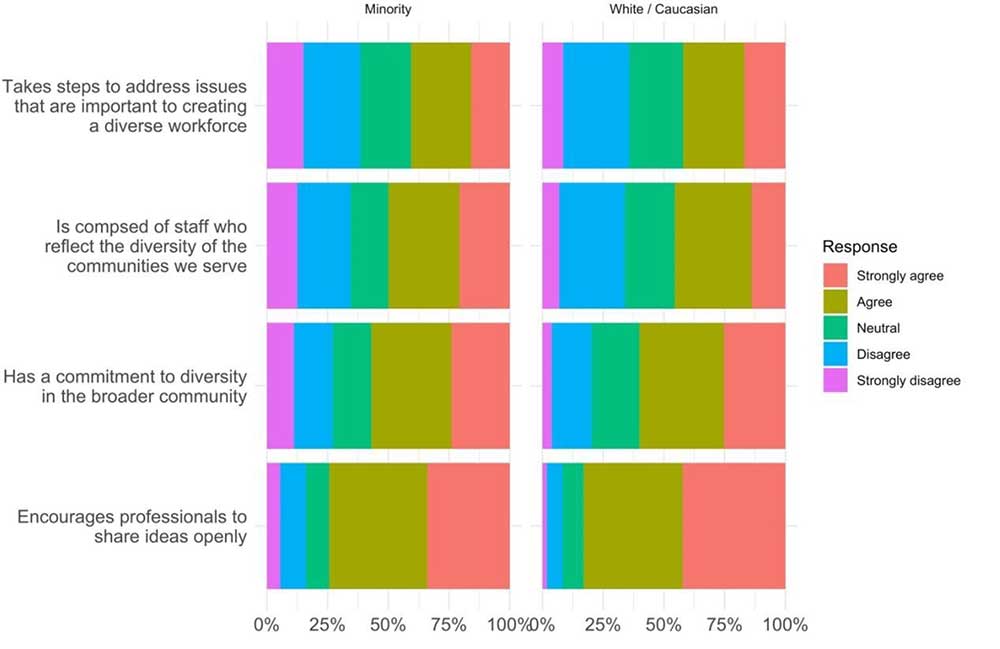Survey Says: Planners Share Insights on Equity, Diversity, and Inclusion

Moving from aspiration to action: Reorienting planners' values towards equity, diversity, and inclusion
Following the worldwide anti-racism protests of 2020, many businesses, institutions, and professional organizations issued statements of support and solidarity. Some also made commitments for substantive change or allocation of resources to support equity, diversity, and inclusion (EDI) goals. Underlying these statements and commitments was an acknowledgment of a harsh reality: that the U.S. still has a ways to go toward addressing racism at home and work. With the newly-released Practitioner Diversity Climate Survey, "Moving from Aspiration to Action: Reorienting Planners Values Towards Equity, Diversity, and Inclusion," the American Planning Association (APA) now has some key insights into the current state of EDI in the workplace and ideas for action and reform.
Survey Examines Diversity Climate in Planning
The ACSP/APA Practitioner Diversity Climate Survey was initiated in 2019 through a collaboration between the APA, APA's Diversity Committee, and the Association of Collegiate Schools of Planning Planners of Color Interest Group (ACSP-POCIG). In 2016, a team of POCIG researchers published a diversity climate survey of planning students in the Journal of Planning Education and Research. The team found gaps between the stated value of diversity to planning departments and the experiences of 'diverse' students, including African American, Latinx, and international students. The study identified key areas for planning educators to make curricula and classrooms more inclusive and provide better training for serving diverse communities. With some understanding of the climate for diversity where planners are trained, the next question was about the environment where planners work.
Researchers collected over 3,000 survey responses from APA members between January and March 2019, complemented by over 100 practitioner interviews. Practitioners were asked to share their perspectives on:
- Overall workplace satisfaction
- Workplace interactions with colleagues
- Professional education and preparation
- Efforts of professional organizations to incorporate EDI efforts
Key findings centered on themes of representation (who plans, and whose values are validated and gaps between stated commitments to diversity and day-to-day workplace cultures (Figure 1). Both the survey and interviews revealed stark differences in perceptions of workplace bias and discrimination by race.

Figure 1: Satisfaction with workplace approach to diversity
Report Exposes Racial Disparities in Planning
White planners reported fewer personal experiences of bias or discrimination tied to a disability, nationality, gender identity, age, race, or ethnicity; instead reporting witnessing gender discrimination, but little else. Planners of color (PoC) witnessed discrimination across every dimension of difference that seemed invisible to White colleagues. Reports of discrimination are common among PoC, but only a few reported frequent and persistent acts of bias and discrimination. Overt discrimination is rare, but a pervasive climate of institutional and cultural bias persists.
Based on planners' insights, in the report, we provide recommendations to planning professional organizations (APA and ACSP), employers, and planning educators. We highlight key takeaways below to guide employers and practitioners, particularly on ways to integrate EDI into the workplace. Read the complete recommendations in the executive summary or full report.
Organizational Leadership & Diversification
- Recruit planners from diverse institutions, non-traditional sources, and allied fields with greater diversity to expand the applicant pool.
- Evaluate current promotion trends and provide more opportunities for promotion of underrepresented groups, particularly for leadership positions.
- Develop strategic racial equity action plans to identify and guide EDI efforts.
Professional Development
- Expand training opportunities in diversity, anti-racism, cultural competency, implicit bias, and multicultural awareness that are required on an ongoing basis.
- Provide internal training by external consultants/professionals to support managers with tools to address hiring and promotion bias.
Workplace & Community Capacity Building
- Create divisions of EDI or race and equity that develop policies, practices, and strategic investments to reverse racial disparity trends and eliminate institutional racism.
- Commit to conducting racial impact assessments to determine the impact of planning decisions on communities of color.
- Develop community classrooms or workshops in partnership with local communities to support engagement efforts and increase the accessibility of planning expertise.
- Planners, especially those who identify as White, should reflect on how White-centered perspectives appear in their work, including planning tools and processes, and work to change these systems
EDI Initiatives Need Continuous Support
Planners acknowledge that employers are responsible for creating a climate of inclusion that starts at recruitment and continues through promotion. Employees also need ongoing training and support to accomplish these goals. After implementing EDI initiatives, employers need to monitor and evaluate their effectiveness. While many institutions and workplaces value diversity, demonstrating these values through meaningful actions is challenging. Planners, employers, and planning institutions need to "walk the talk" by taking long-term steps beyond reactive and temporary actions.
Top image: monkeybusinessimages/iStock/gettyimagesplus
About the Authors








